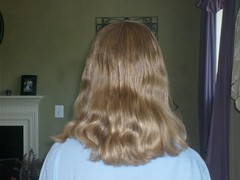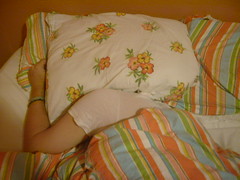I sometimes wonder what a normal relationship between a person and their parents is. I find the question particularly interesting when applied to people my own age, people who have just stepped into young adulthood and into a new dimension of freedom but who by and large lack the financial resources to support themselves.
What are their trips home like? How do they interact with their mothers and fathers?
One of the accepted stereotypes of the university experience is a stream of phone calls from worried parents urging their children to eat right, get plenty of rest, and, most importantly, visit home more often. In popular culture, the occupants of empty nests are depicted as concerned, unadjusted to their children's absence, and delighted at any opportunity to see sons and daughters who are usually on campus.
No part of me has ever believed this cultural story. I see it as a joke. How could I do otherwise, when my own parents are so oblivious to my being gone and register no apparent happiness when I'm home?
In discussing his own mother and father some time ago, Smart Roommate smiled.
"I'm really spoiled," he said. "I don't pay for anything. My cell phone, my car payment, they cover it all. But they push me; I never get to slide on anything."
"They sound awesome," I said, referring both to the financial support and to the unspoken emotional support that accompanies directing a child steadfastly towards the right path.
"It sucks that I can't get away with much," he said. "But, yeah, it means they're being good parents."
I struggle to comprehend that kind of life.
I came home this weekend to pick up text books and take care of a cell phone bill that my parents started forcing me to pay as a twenty-first birthday present, and one of the first things my mother said to me was, "You need to tell us when you're coming home."
She was clearly irritated that I'd decided to stay.
We largely ignored each other for the duration of the weekend, until early this afternoon, when one of her typical demonstrations of rudeness finally drove me to speak up.
Intent on studying, I'd carried my textbook and iPod into the kitchen, where I left them on the table as I went back into the basement to retrieve something. When I was coming back up the stairs, something silver flew past me and landed on a step, followed by a glossy book.
She'd found my things, and, in her usual reaction to coming across items "left out" where they don't belong, she tossed by property down the stairs.
"Hey, Mom," I said as I headed into the kitchen, book and iPod in hand. "It's commons sense that you don't throw an iPod down the stairs."
"Then maybe you shouldn't leave your shit laying around," she responded.
This is characteristic of her mentality. She has always presumed that she can disrespect and violate others without facing any kind of retribution. For years, she has made a habit of taking our clothes out of the dryer if we've not gotten there before her and then throwing them across our bedrooms in the most haphazard way possible, leaving shirts strewn across chairs and freshly-laundered underwear on the carpet.
Several months ago I did this to her, and when she got home to find the mess she asked who had made it. I told her I had, and she wanted to know why.
"You do it to us all the time," I replied.
"I don't care," she responded. "I pay the mortgage. Who the hell do you think you are?"
In her mind, her financial responsibilities confer upon her the right to be inconsiderate of everyone else but demand their reverence nonetheless. Unfortunately for her, I have never played that game and never will.
"Well, leave my stuff alone," I said today in reaction to her line of reasoning.
"If you leave your shit out, it's going to get thrown," she said.
I stopped and thought about what I should say.
"Okay," I enunciated slowly, trying to control my anger. "Well, if you don't leave my shit alone--" I used the term she insisted upon--"then I'm going to start throwing your shit around."
"I dare you," she said, her eyes and voice full of menace. She thinks she's dangerous when she's like this, and perhaps that memories of childhood abuse will cow me into submission now.
"And what will you do?" I asked.
She didn't reply.
The truth of the matter is, I've never hit a woman, and I'm not given to the types of bellicose threats of which she and her ilk are so fond. When she's tried to strike me in recent years I've just held her arms until she's stopped, but as time goes on I lose more patience and start to regard this line of benign defense less favorably.
When I look at it objectively, I see two things: she hasn't really earned the kind of restraint I've employed with her, and she would not be at a disadvantage in a confrontation.
She actually outweighs me by about ten pounds and has more than proven her ability to fight. I'm not saying that I'd ever just jump my mother, but I am saying that if she were to assail me again as she's done in the past (when I was seventeen she actually drew blood with a bite to my hand), my tolerance would likely run out. In this case, my size is for once an advantage; Powell is so huge that any reckoning between him and a person of my mother's stature would be patently uneven. When she hits him, he has no choice but to take it. In my case, though, an unprovoked physical assault could be legitimately responded to in kind.
She likes to intimate violence, but for her sake I hope she never attempts to carry it out again. She's bigger, but I have seventeen years of memories from which to draw rage.
I am not the kind to throw the first punch, but if attacked I will defend myself. That is all I mean to say on that.
Her casual discourtesy escalated into a full-fledged argument that soon turned, as these things inevitably do, to the issue of my tuition.
"You don't even like us," she told me, speaking of herself and my father. "You're just using us."
"Why do you say that?" I asked.
"You said it," she said.
"Yeah," I replied. "One time, out of anger, and you've never let it go."
"That's not true," she continued. "The other kids say it, too. They tell us that you say that."
"Well, I don't know why they would," I said.
"We're just your meal ticket," she said.
"Oh, really?" I said, actually laughing. "And what am I using you for? Is it for the tuition you don't pay? Or maybe it's for the cell phone bill you don't pay? Or maybe it's for the car insurance you don't pay?"
"We have done plenty for you," she exclaimed. "We've given you $20,000.00 for school. Don't you dare act like we haven't helped you. You are not my responsibility anymore."
"Yes," I said. "Yes, I am."
It is my belief that a parent's job does not end when their child turns eighteen. The parent's task is to provide their son or daughter with all the tools they need to enter the real world as successful adults, and in today's environment that means paying for a college education if they are able, which my parents are.
They have tried to shirk this duty for years, and my ongoing insistence that they fulfill their natural obligations is a constant source of conflict in our household.
My father recently put forward the idea of my getting my own car insurance, independent of their plan.
"Do you realize," I said to my father. "That by forcing me to take on more financial responsibilities now, when I don't have the resources to cope with them, you're increasing the likeliness that I'll be dependent on you after graduation? I am in a substantially weaker financial position today than I was a year ago because of burdens you've put on me."
"I don't want to talk about this right now," he said. "The conversation's over."
I will not let them wipe out my savings, which until I get a real job are non-renewable. Neither of them seems to care that by asking me to pay more and more, they're slowly chipping away at my ability to separate myself from them in the future.
This, however, is consistent with their philosophy in many areas: an emphasis on short-term gain over long-term consideration that inevitably leads to poor policy choices.
A similar issue played out during my teenage years when I was growing my hair out for the first time: because it was so thick and poofy, my father, feeling he should do something, insisted I get it cut at least once every month, sometimes to the point of having three or four inches shorn. When I tried to explain to him that if he let me go longer without trims I would soon be able to tie my hair back, he disregarded the logic. The predictable result was that my hair's awkward stage was significantly prolonged and that getting it long enough for a ponytail, a goal that should have been reached within a year, took about twice the time.
It happened even that quickly solely because I spent the summer of 2004 in another state and went three months without a haircut. The situation improved only when he was removed from a decision-making position.
This same stubbornness is being exhibited with regard to my college education and overall financial support, and I was quick to throw my mother's hypocrisy in her face when she said that at twenty-one years old I should be providing for myself.
"Really?" I said. "Because I guarantee you that you won't feel that way when Thomas and Pie are my age. You can say whatever you want now, but I bet anything that their college will be paid for."
"You're damn right," she said.
"So they're your responsibility, but I'm not?" I asked.
"Yup," she said. "I'll scrub toilets if I have to so they can go to college. Does that piss you off?"
The closing question reveals a lot about the type of person she is, and about the profound differences between us. She's a taunter; she does things that she knows will hurt, and in inquiring as to my feelings she was looking to see if her professed zeal in paying for my younger siblings' education, a petty jab at me, had hit its mark.
She also believed, in a key misestimate, that the knowledge of my siblings being paid for while I was made to struggle would inspire some sort of resentment in me. She thought, possibly, that I would wish them to have to plough through debt and uncertainty because I did.
She was wrong, though.
In fact, one of the first emotions that went through my mind upon hearing her declaration, alongside the anger I felt at the obvious double standard, was relief. I am relieved that Thomas and Pie will not have to go through what I've been through and that their educations will be secure.
A real part of me was happy.
"No, Mom," I answered. "You paying for their school could never make me angry, because I love them and I want to see them have that opportunity. I would never take that away from them."
That short reply sums up completely the vast gulf that separates this son from his distant mother. I am not vindictive, petty, or snide. I do not seek to bring others down just because I have been brought down. I am a better person than that. I am better than her.
In one aspect, though, she succeeded; her words did hurt me. I refused to let her see that, but it was true.
You see, the woman, Marie, whom I call my mother did not give birth to me. Another woman, named Anne, did that, but when she and my father separated, Marie came into our lives. She has been with me, in one way or another, since I was three years old. She bandaged my wounds, kissed my scraped knees, scrubbed me in the shower, walked me to daycare, cooked my meals, told me bedtime stories, taught me how to count past ten, and changed my brother Powell's diapers. She is the only mother I've ever known, and today she told me without saying it that I'm not really her son.
There's no way that can't sting.
It's perhaps not as bad as I thought it would be, because it's been presaged by years of abuse and scathing criticism alongside genuine love, and, on my side, a consistently hardening resentment and anger. It's still not great, though.
When I look at the three individuals who I can reasonably call my parents, I feel a void of sadness and disappointment.
The mother who raised me cannot be my mother in the full sense, cannot provide the emotional backing a son needs.
Anne, who actually carried me, has proven herself completely useless, unable to contribute money to my education and incapable of overcoming her own ever-present drama long enough to be a moral pillar in helping me confront my own issues. She's not a mother in any sense of the word.
Then there's my father, a drunk whom I despise, with whom every conversation becomes a playing-out of our disagreements. He is crude, juvenile, unprofessional, unreliable, and given to bouts of addiction and depression. In maturity and outlook he embodies all the worst traits of adolescence, transfusing out from a grossly bloated red body.
In all of this, I feel as if I have no parents, no one who's stable, or fair, or selfless, no one I can turn to with full confidence.
It's like I'm an orphan.

































